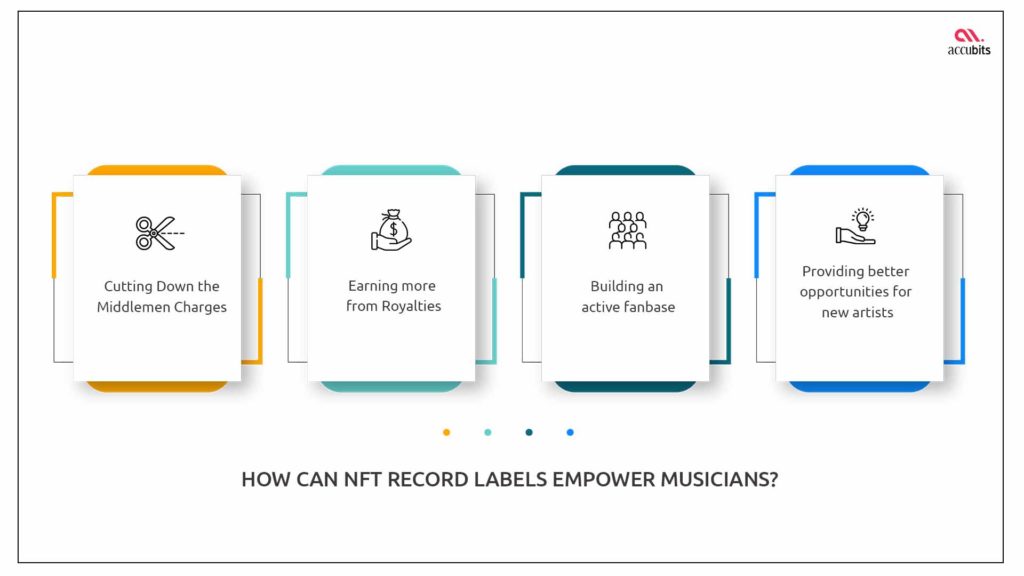
From gramophones to vinyl records to streaming platforms, the music industry has intricately been affected by technological advancements. Each evolution has changed the reach and manner of consumption and monetization of music content. The latest addition to this is an NFT record label that brings up exciting opportunities for artists and their fan communities.
This article is a brief guide to what music NFTs are, how they work, and some of the craziest music NFT projects.
- What is Music NFT?
- What is an NFT Record Label?
- How does an NFT Record Label Work?
- How can NFT record labels empower musicians?
- How to create an NFT record Label?
- Popular NFT record labels in the music industry
- Bottom line
What is Music NFT?
An NFT is a non-fungible token representing ownership of a digital asset such as a song, photo, video clip, digital artwork, etc. NFTs are stored on the blockchain as a one-of-a-kind collectable and cannot be faked, copied, or deleted.
Music NFT is a certificate of ownership of a unique musical work where the owner has the exclusive right to determine how the composition is used. Music NFTs are changing the way bands, composers, and music artists connect and interact with their listeners.
At the first glance, music NFTs may appear to be the blockchain alternative to buying tracks on iTunes. However, when you buy a track on iTunes, you only buy the right to listen to that music. But music NFTs allow you to listen to tracks while conferring ownership over those files through an NFT.
Music NFTs can take many forms such as concert (physical or virtual) ticket sales, unreleased song previews, sample packs, artworks, autographed merchandise, etc.
What is an NFT Record Label?
An NFT record label allows music artists to completely own their unique songs and recordings by providing them with a certificate of ownership of the asset. The musicians get exclusive rights to the work and can independently decide how the piece of music is used and distributed.
With NFT record labels, artists can form direct relationships with their fans without the need for a traditional record label or a music-streaming service.
How does an NFT Record Label Work?
An NFT record label is essentially a certificate of ownership of a musical work that can be sold to another party. Musicians can use special exchanges (Rarible, OpenSea, Opulous, etc.) to create NFT record labels for their recordings. They can submit their recording to one of these platforms that help them get it on the blockchain and advertise it to possible investors. Alternatively, musicians can mint NFTs themselves and sell them directly on an NFT marketplace such as Crypto.com, Binance, Rarible, Royal, and OpenSea.
To understand with a traditional example, let’s say you have a signed vinyl record from your favourite artist/band that you bought in 1995. Though the music from the artist is still available on multiple platforms, you’re the only one who owns that particular vinyl. There is no other vinyl signed that way and it is quite impossible to replicate it.
Now in 2022, the band is no longer together and a signed record from them goes for $1500. You can sell it and make some cash or hold on to it and see if its value increases more over the years.
Similarly, an artist can release 10 NFTs containing a special remix of one of their songs. Only 10 people in the world will own these NFTs at a given point in time. The NFTs can’t be copied, faked, or deleted. Owners can sell the NFTs and transfer ownership while making or losing money, depending on how the value of the NFT changes over time.
Related article: Applications of NFTs in Digital Entertainment
How can NFT Record Labels Empower Musicians?
NFTs are transforming the music industry in unimaginable ways, offering musicians new opportunities to monetize music by marketing the singularity of the record.

Cutting Down the Middlemen Charges
It’s no secret that record labels, company managers, publishers, etc. make far more money from a musician’s music than the musician himself. But with Music NFTs, artists may be looking at a fairer landscape.
Using NFTs gives musicians the option to continue creating and recording music with the blockchain acting as a witness of immutable ownership. Tokenised music i.e. music NFTs give control back to the artist significantly improving their financial benefits.
Business Insider tells us that platforms like Spotify only deliver royalties of $3000-$5000 per million streams. However, with NFTs, transactions are direct transfers between the participants. The fans receive the content and the artist gets the money.
Earning more from Royalties
The immutable record of ownerships that accompanies music NFTs allows artists to release and share their music with the reassurance that they will personally get the royalties.
To guarantee a constant income stream, an artist can charge a commission on each purchase of an NFT. Musicians can also tokenize concert tickets and avoid the risk of fraudulent releases and black-market ticket dumps.
Building an active fanbase
With music NFTs, fans can invest in a musician’s career literally telling them how much they believe in their potential. Up-and-coming artists can give their fans an opportunity to buy their NFT now with the hope that it will be worth much more in the future.
Moreover, anyone buying an NFT from a smaller artist will do everything to promote the artist, contributing to their growth to drive up the value of the NFT. For the artist, this helps attract future NFT buyers. The artist can then use the sale of NFTs to fund their next project.
To engage their loyal audience furthermore, artists can include some exclusive fan perks for those who buy their NFTs. A famous example of this is how the Kings of Leon releases an NFT that includes their new album as well as 4 front-row seats and a VIP experience at any Kings Leon concert for the rest of the token holder’s life.
Music NFTs can act as social tokens which create a direct link between artists and audiences without relying on any middlemen. This is beneficial for the fans and the artists alike.
Providing better opportunities for new artists
Music NFTs also provide a simpler entry point for budding artists. Unlike the analog world, they give an equal opportunity to small, upcoming artists to create a loyal fanbase. Not to forget that music NFTs make it easy for artists to reach a global market from the get-go.
The digital world levels the playing fields and makes music equally accessible to everyone, irrespective of their location in the world. Moreover, the sale of music NFTs (in their several forms) provides a direct financial benefit to the artist.
How to create an NFT Record Label?
Musicians can build NFTs on a variety of platforms such as OpenSea, Rarible, Opulous, etc. The basic steps include signing up on a platform, setting up a wallet, and choosing the option to create an NFT.
Most platforms give musicians the option to create a single collectable or several collectables.
Single Collectable: A single collectable that creates a one-of-a-kind NFT.
Several Collectables: Releasing multiple copies of the same collectable.
After uploading the file, the artist must fill in information such as the title, description, royalties for income from secondary market sales, the price for each occurrence of NFT, etc.
Once everything has been set up, artists must link their wallets to establish the NFT. To sell the NFT, artists are required to pay the gas fees to the platform.
Making Music NFTs
The musician must first decide if they will turn their album, mixtape, or EP into an NFT.
Choose a Blockchain: Music NFTs can be minted on a dozen different blockchains. However, it is worth noting that each blockchain has its own NFT Token protocol, marketplace, and wallet services. For instance, if you make NFT music on Tezos, you will only be able to sell it in Tezos-compliant outlets.
Alternatively, artists can use established platforms to create music NFTs. OpenSea, Rarible, Foundation, Binance, SuperRare, and Crypto.com are some popular music NFT marketplaces that also allow you to create NFTs.
Connect Your Wallet: Because NFTs live on the blockchain, they can only be accessed via cryptocurrency. Therefore, a wallet will be necessary. You will need a crypto wallet capable of holding NFTs e.g., Meta-mask, Trust Wallet, etc. Once you connect your wallet to the blockchain of your choice, you need to deposit the relevant cryptocurrency in the wallet.
Mint Your Music: Follow the platform’s guidelines to mint/create your music NFT.
Choose the Price: Wait for the platform to authorize your NFT and choose the sales price. And just like that, you’ve released your first music NFT!
Popular NFT Record Label in the Music Industry
Some artists have already started experimenting with the concept of music NFTs. Some of the most popular ones include:
Kings of Leon
King of Leon’s NFT project called NFT Yourself shone a light on the possibilities the crypto world holds for musicians. The band sold limited-edition digital copies of When You See Yourself, its latest album as an NFT. It came with digital art and a collectable vinyl record. Some other art pieces based on the album’s theme were also sold with perks such as front-row tickets to the band’s shows for life. The NFT album earned about $2.5 million in sales.
3LAU
DJ Justin Babu made music history in spite of a small fan following and sale of just 33 NFT-linked vinyl records. His first blockchain-based album Ultraviolet earned $11.6 million.
Grimes
Musician and visual artist Grimes dropped his NFT WarNymphs which was not just a music NF but a collection of art and videos set to music. This project attracted close to $7 million. A single unique piece in the collection, Death of the Old, auctioned for about #389,000 on Nifty Gateway.
Eminem
The legend’s first NFT collection Shady Con included digital action figures based on some of his iconic characters from previous music videos. The most valuable item in this collection was STAN’s REVENGE, a unique video accompanied by a rare pair of the artist’s Carhartt Air Jordan trainers.
RAC
André Anjos, the Grammy-award-winning Portuguese-American producer, sold a collection of NFTs related to his new record YOU earning $708,000—more than his combined album sale in the last decade.
Related article: Where will NFTs pop up next?
Closing Thoughts
With more and more artists and companies appreciating the value of the NFT music industry, this industry is gradually gaining recognition. Not only does it give artists a creative space to develop something unique for their fans, but it also provides much-needed freedom of revenue for them.
Irrespective of the challenges it has yet to solve, there is no denying that the emerging music NFT record labels give musicians more control and decision-making power, providing them with new and fair revenue streams. Simultaneously, it gives fans the opportunity to interact with their favorite artists in a completely new way.


